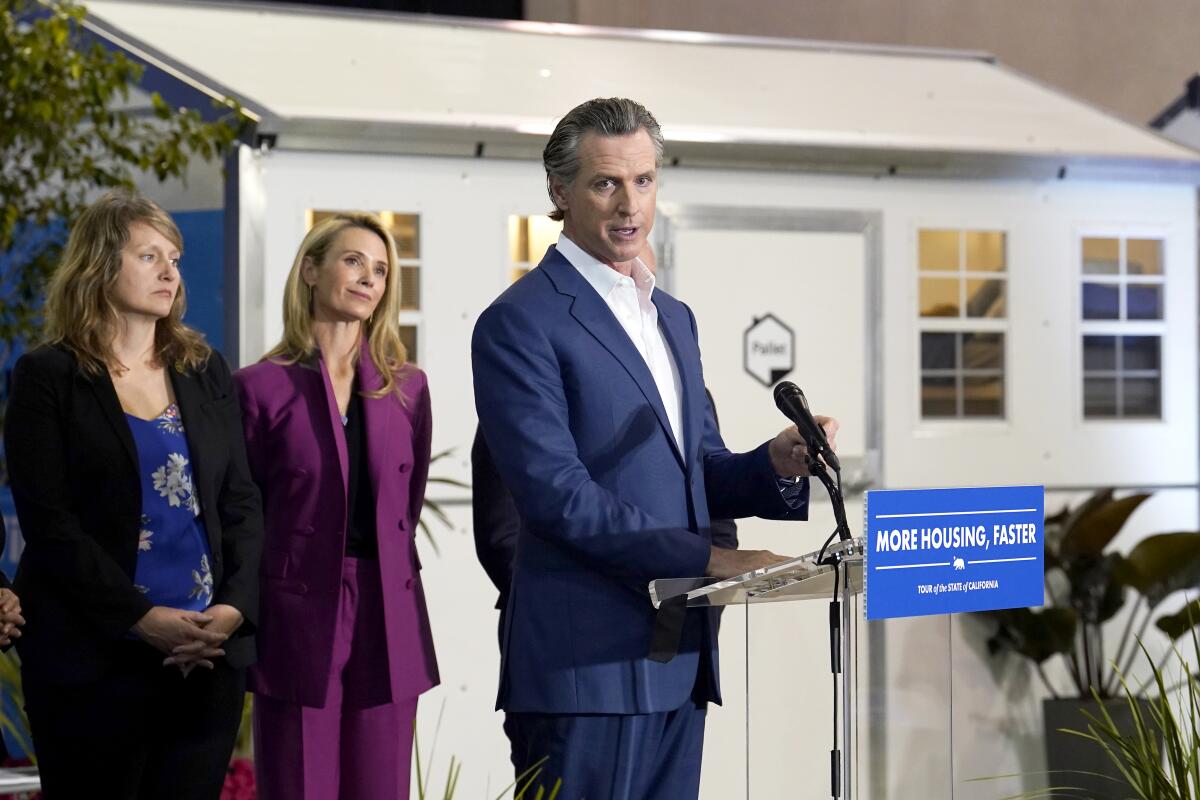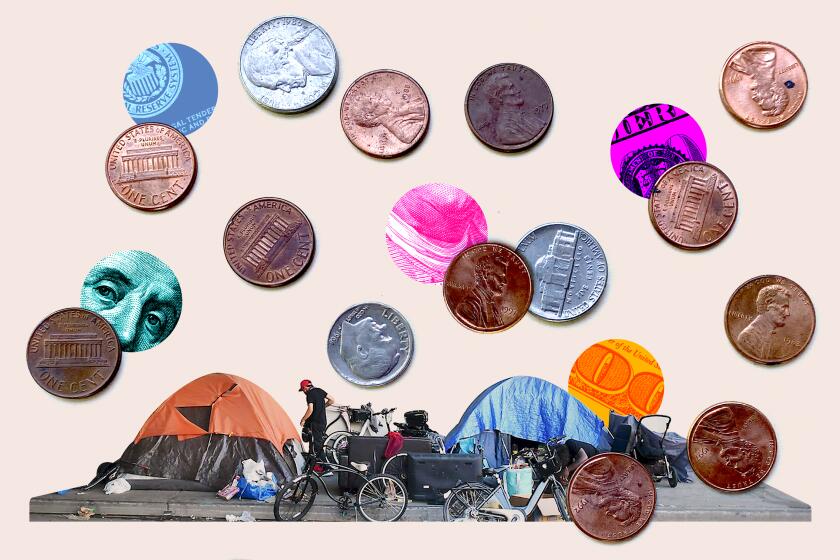Newsom proposes bond measure, sweeping mental health reform in California

- Share via
SAN DIEGO — Gov. Gavin Newsom is asking lawmakers and voters to approve sweeping mental health reforms that would commit billions of dollars in state funding for behavioral health-based housing and treatment facilities throughout California.
The Democratic governor’s proposal, unveiled Sunday in San Diego, would raise at least $3 billion through a bond measure to fund the construction of new mental health campuses, residential settings and permanent supportive housing. Newsom wants to redirect another $1 billion in funds annually from an existing income tax on top earners to operate the facilities, his office said.
“It’s unacceptable what we’re dealing with, at scale now, in the state of California,” Newsom said during an event at Alvarado Hospital Medical Center to announce his plan. “We have to address and come to grips with the reality of mental health in this state and our nation.”
The governor’s call for a 2024 ballot measure to modernize the state’s behavioral health system is the capstone of his State of the State tour.
Instead of delivering a traditional speech to lawmakers at the Capitol this year, Newsom traveled around California to launch his political agenda for his second term in office. The governor unveiled an ambitious goal in Sacramento to reduce homelessness statewide, traveled to San Quentin to announce the transformation of the maximum-security prison into a rehabilitation center and touted a new contract in Downey to produce low-cost insulin under a state label.
The governor’s aides billed his effort to rework the state’s mental health system as an opportunity to turn the page on decades of failure to build an effective community-based system in California. Newsom often points to efforts under former Gov. Ronald Reagan to end involuntary commitment and close state-run psychiatric hospitals in the late 1960s as a primary driver for why so many people live on the streets or behind bars today.
A stronger mental health system is imperative to Newsom’s agenda to reduce homelessness and fix the criminal justice system. At a time when violent crime is rising and voters remain frustrated with the lack of progress on the unhoused crisis, it’s also critical to the Democratic governor’s legacy.
“He’s committed to it,” said Sean Clegg, one of Newsom’s senior political strategists. “He’s going to lead, and he’s going to spend his political capital.”
A key component of Newsom’s plan is to reform the Mental Health Services Act of 2004, which was approved by voters under Proposition 63 to establish a 1% income tax on millionaires in California as a way to shore up funding for county-run services.
Funding has fluctuated over the years, but equaled about $3.3 billion in the 2022-23 fiscal year, according to the nonpartisan Legislative Analyst’s Office. Proposition 63 funding now accounts for roughly 30% of the state’s public mental health system, the governor’s office said.
Newsom’s announcement would overhaul the funding structure to redirect 30% in Proposition 63 funds each year, or about $1 billion, toward operating community housing for those at risk of or currently experiencing homelessness and people who have severe mental illnesses and substance-use disorders. Some of the housing created would be set aside for veterans in California.
The proposal also includes changes to Proposition 63 that would allow money to be spent solely on substance use treatment for qualifying people, which is not currently allowed, according to the governor’s office.
A millionaire’s tax was helping fund new mental health programs in California. But the Great Recession changed things — and counties got desperate.
The governor’s office said the bond measure he proposed for the 2024 ballot would pay for enough new beds for mental health care to serve more than 10,000 additional people every year. The state faces a shortage of 6,000 behavior health beds, his aides said. Newsom said the goal is to raise between $3 billion and $5 billion with the bond measure.
“This is a big idea. It’s half a century overdue in the state of California,” Newsom said.
Sacramento Mayor Darrell Steinberg, who helped write Proposition 63 when he was a state lawmaker, said he supported Newsom’s changes.
“We’re coming on 20 years, and after nearly two decades, it’s always time to update and modernize a good law and to make it more focused on the most serious consequences of untreated mental illness,” Steinberg said.
Steinberg said Proposition 63 has helped “hundreds of thousands of people,” but that the need now is for greater focus on people living in homeless encampments with severe mental illness and those coming out of the criminal justice system.
“There already is focus. There just needs to be more focus,” he said.
Los Angeles Mayor Karen Bass said Newsom’s plan will free up more bed space for those in need.
“These reforms will help us tackle the crisis on our streets and bring more Angelenos indoors with the support they need,” Bass said in a statement. “I support these efforts and look forward to working with the Governor and Legislature to ensure their success on the ballot.”
State Sen. Susan Eggman (D-Stockton) said she’ll unveil legislation to implement Newsom’s plan and put it on the ballot. Proposition 63 was a strong start to addressing California’s mental health crisis, Eggman said, but she agrees that it’s time for a “remodel.”
The changes will ramp up construction of and sustainable funding for the kind of “housing that heals,” but is in such short supply, she added. That might include new cottage communities or adult residential housing that is less restrictive and more neighborhood oriented, rather than locked facilities that keep people separated from the general population.
Sunday’s announcement would add to a series of recent changes made by lawmakers to retool California’s mental and behavioral health system since its last major overhaul six decades ago.
That includes Medi-Cal expansion and permitting some benefits to incarcerated people before they’re released from prison. Eggman was one of two lawmakers last year who helped pass Newsom’s new program to treat those with severe mental illness, known as CARE Court (for Community Assistance, Recovery and Empowerment).
The plan set up a new court system that would compel treatment for those suffering from severe mental illness, a population the state estimates to be between 7,000 and 12,000 people. Eight counties, including Los Angeles, are expected to roll out CARE Courts this year, and the rest of the state will join in 2024.
CARE Court will allow family members, first responders and health professionals, among others, to petition a judge to order an evaluation of an adult with a diagnosed psychotic disorder to determine what services that individual needs.
Organizations representing families of affected loved ones strongly supported Newsom’s ambitious new program, but the proposal ignited intense opposition from disability and civil rights advocates, who spent much of the year raising serious concerns that CARE Courts would remove personal freedoms and funnel at-risk individuals into the legal system.
In January, many of the same groups that had lobbied against CARE Court filed a lawsuit asking the state Supreme Court to block the rollout of the new law, which Newsom signed in September as Senate Bill 1338.
Gov. Gavin Newsom signs CARE Court proposal into law, a sweeping plan to order mental health and addiction treatment for thousands of Californians.
This year, Eggman introduced a bill to expand the definition of “gravely disabled,” used to determine if someone qualifies for a conservatorship. The change could mean that more people might qualify for a conservatorship if their mental or physical health poses “a substantial risk of serious harm” due to their conditions.
“I think all of these pieces that we put together, and this redo of [the Mental Health Services Act], is going to be the last big transformational piece,” Eggman said.
Andy Imparato, executive director of Disability Rights California, said more money for mental health housing is a good thing and that Newsom’s announcement seemed to largely bring welcome news.
While an integral part of Newsom’s reform effort would be to strengthen accountability and transparency around access, quality and spending of county behavioral health and Medi-Cal plans, Imparato said concerns remained over how some counties spend Proposition 63 funding. He wants to make sure that the money for new housing isn’t pulled from other treatment services.
Michelle Doty Cabrera, executive director of the County Behavioral Health Directors Assn., agreed.
“We want to thank the governor for hearing our pleas to address the shortage of housing options for clients,” Cabrera said. “However, we need these investments to be additive rather than shifting resources away from upstream prevention and treatment. There’s no way we will end this crisis without both: housing and treatment services.”
Imparato also said that Disability Rights California and other organizations that fiercely opposed CARE Court might still feel hesitant to work with Newsom on yet another mental health initiative.
It will be critical, Imparato said, that peer supporters and those with lived experience with mental illness and substance use disorder have a seat at the table in this year’s proposal.
“My hope is that we are going to see more of a collaborative approach,” he said.
Personal essays, insight from experts and resources to help manage mental health.
More to Read
Sign up for Essential California
The most important California stories and recommendations in your inbox every morning.
You may occasionally receive promotional content from the Los Angeles Times.















